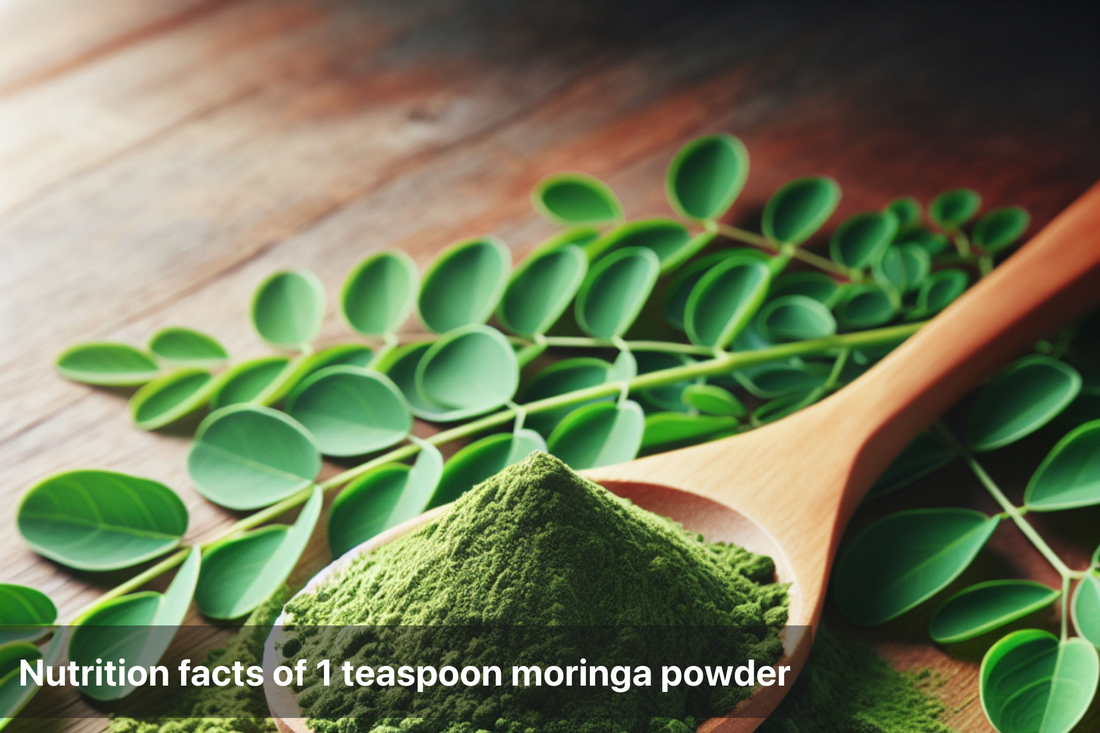
Nutrition facts of 1 teaspoon moringa powder
Share
Moringa powder, derived from the dried leaves of the Moringa oleifera tree, has earned the title of a "miracle plant" thanks to its powerful nutrient profile. Even a single teaspoon can deliver impressive amounts of essential vitamins, minerals, and plant-based protein. Whether added to smoothies or stirred into warm water, moringa is a compact nutritional powerhouse for those seeking better energy, immunity, and overall wellness.
How Much Is 1 Teaspoon of Moringa Powder?
One level teaspoon of moringa powder typically weighs around 2 grams. Though small in quantity, this amount is densely packed with nutrients, making it ideal for daily supplementation.
Core Nutrition Facts of 1 Teaspoon Moringa Powder (Approx. 2g)
Nutrient |
Quantity (per 1 tsp / 2g) |
% Daily Value (Approx.) |
|---|---|---|
Calories |
7–10 kcal |
— |
Protein |
1g |
2% |
Fiber |
0.4g |
2% |
Calcium |
40–50 mg |
4–5% |
Iron |
1–1.5 mg |
5–8% |
Potassium |
60–70 mg |
2% |
Magnesium |
8–10 mg |
2% |
Vitamin A (Beta-carotene) |
300–400 IU |
6–8% |
Vitamin C |
5–7 mg |
6–10% |
Antioxidants (Polyphenols, Quercetin, Chlorogenic acid) |
High |
— |
These values may vary slightly depending on how the moringa is grown, processed, and stored.
Key Health Benefits of Moringa in Small Doses
1. Rich in Antioxidants
Moringa contains potent antioxidants like quercetin and chlorogenic acid, which help neutralize free radicals and reduce oxidative stress. Even small amounts can contribute to overall cellular health and inflammation reduction.
2. Supports Immune Function
With its natural vitamin C and beta-carotene content, moringa powder helps support the immune system and may reduce susceptibility to infections and seasonal illnesses.
3. Boosts Energy and Reduces Fatigue
The combination of iron and magnesium contributes to improved oxygen transport and energy metabolism, reducing daily fatigue and brain fog without stimulants.
4. Promotes Bone and Muscle Health
Calcium, magnesium, and potassium are essential for maintaining bone density and muscle contraction. Moringa provides plant-based sources of these minerals, especially beneficial for vegans or vegetarians.
5. Improves Skin Health
Vitamin A and antioxidants help improve skin tone, combat acne, and may delay premature aging when moringa is consumed consistently and paired with a healthy diet.
How to Consume Moringa Powder Effectively
Mix in warm water or herbal tea for a simple detox drink
Add to smoothies with banana, spinach, and citrus for an immune-boosting blend
Sprinkle over salads or soups for a subtle earthy taste
Blend into pancake or energy bar batter for nutrient-dense snacks
Use in chutneys or green sauces to enrich Indian meals
Suggested Daily Dosage
While 1 teaspoon is safe and effective for general wellness, some people may consume up to 2 teaspoons (4g) daily. It’s best to start with 1 tsp/day, then observe tolerance and adjust if needed.
Tips to Maximize Absorption
Pair with vitamin C-rich foods (like citrus or amla) to enhance non-heme iron absorption
Take with healthy fats like nuts or ghee to increase absorption of fat-soluble nutrients
Use consistently over weeks to see subtle but sustained improvements in energy and immunity
Avoid adding to boiling liquids as extreme heat may reduce vitamin C and antioxidant potency
Precautions and Side Effects
Start small: Higher doses may cause digestive discomfort (bloating, diarrhea) in some people
Avoid during pregnancy: While the leaves are generally safe, moringa bark and roots can be harmful
Interactions: If you’re on blood pressure or thyroid medication, consult your doctor before regular use
Store in airtight containers: Exposure to light and moisture may degrade the nutrient content
Moringa vs Other Supergreens (Per 2g Comparison)
Superfood |
Calories |
Protein |
Iron (mg) |
Vitamin A |
Notes |
|---|---|---|---|---|---|
Moringa Powder |
7–10 |
1g |
1–1.5 |
300–400 IU |
High in antioxidants |
Wheatgrass |
~5 |
0.4g |
0.4 |
100 IU |
Alkalizing and detoxifying |
Spirulina |
~8 |
1.2g |
0.5 |
Minimal |
Highest protein per gram |
Matcha |
~6 |
0.3g |
Minimal |
100 IU |
Rich in caffeine and catechins |
Frequently Asked Questions
Q. Can I take moringa powder every day?
Yes, 1–2 teaspoons daily is safe for most adults. It’s best consumed in the morning for energy or with meals for better absorption.
Q. What does moringa powder taste like?
It has an earthy, slightly bitter taste, somewhat like spinach or matcha. It blends well in smoothies or savory dishes.
Q. Does moringa powder help with weight loss?
While not a fat-burner, moringa can support metabolism and curb cravings due to its nutrient density and fiber.
Q. Is moringa good for iron deficiency?
Yes, it contains non-heme iron and vitamin C, making it helpful for mild iron deficiency when consumed with absorption-enhancing foods.
Q. How should I store moringa powder?
Store in an airtight container, away from sunlight and moisture, to preserve its color and nutrient profile.






